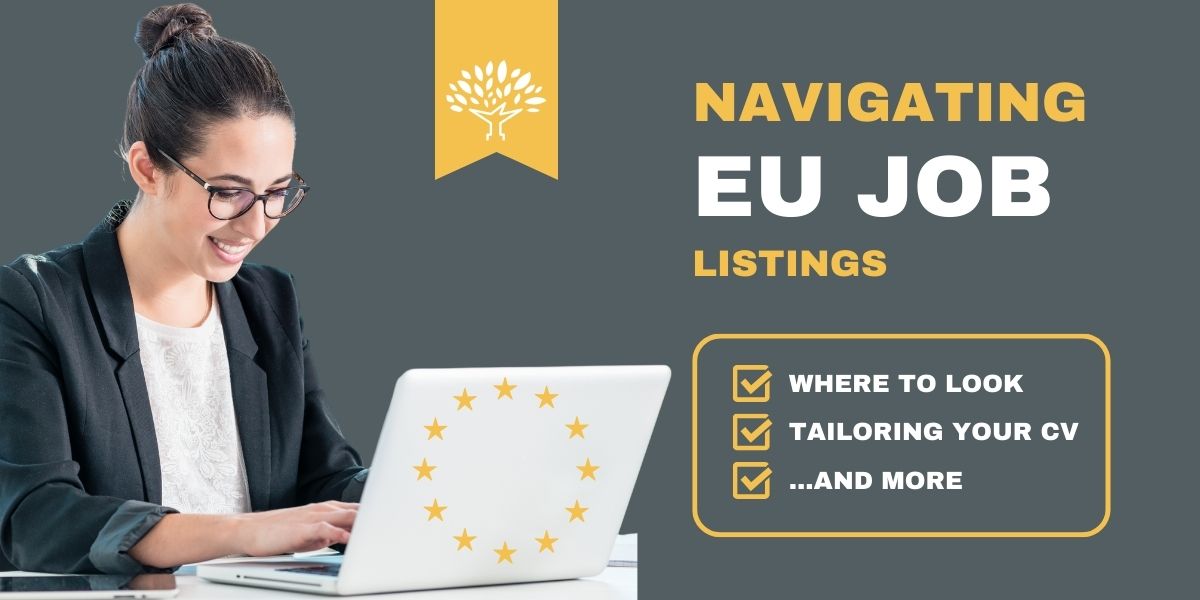Navigating the maze of EU job listings

In today's competitive job market, snagging a job within the European Union is about more than just having the right qualifications and experience. We’ve put together an easy-to-follow guide that will make your EU job search less stressful and yield more positive results.
Watch this webinar to learn more about the EU recruitment system.
-
Where to look for EU jobs?
You don't need to lose sleep scouring every corner of the internet for EU job listings. Did you know we have our very own EU Jobs site? This is a comprehensive list of EU job vacancies updated weekly. Here are a few other reliable sources:
- EU Careers: the go-to official spot for employment opportunities within the European Union
- EURAXESS: a haven for researchers looking for opportunities in Europe
- LinkedIn: your digital networking friend with a vast array of job listings, EU gigs included
- EURES: the European Job Mobility Portal, which is great for finding jobs across the EU
-
Understanding job listings
Job listings can sometimes feel like reading hieroglyphics. Let’s simplify:
- Job grades: These are levels within the EU institutions indicating the position's seniority. Understanding the grade can help you gauge the role's expectations. Read more about the different EU job profiles and grades here.
- Eligibility criteria: These may include qualifications, experience, and citizenship requirements. Make sure you tick all the boxes before submitting your application.
- Required competencies: These are the skills and attributes the employer deems necessary for the role. Tailor your CV and cover letter to encompass these competencies.
- Language requirements: EU jobs love a polyglot. Flaunt your language skills that match up with the job’s needs.
-
Tailoring your CV
Your CV should reflect the specific requirements of the EU role you're applying for. The Europass CV format is widely accepted and can help standardise your application, making it easier for employers to assess your qualifications. Ensure your CV is concise, clear, and relevant to the role. Book a personal coaching session and polish your CV with one of our coaches.
Watch this free webinar and get practical and hands-on tips on how to perfect your CV, and learn more about what recruiters and HR officers look for when recruiting within the EU institutional context. Just log in to your EU Training account, click 'Add to cart' and the video will be automatically added to your account, free of charge.
-
The application process
Filling out the application form requires attention to detail:
- Follow instructions carefully and answer all questions truthfully.
- Craft a motivation letter that’s both heartfelt and professional, linking your past triumphs and skills to the job's requirements.
- Triple-check your application for errors. A single typo can undermine your credibility.
In need of a little application assistance? We can help with that too.
-
Preparing for EU exams
Many EU roles require passing specific tests. Familiarize yourself with the format and content of these exams, and roll up your sleeves to dive into practice tests available on our website. Make sure to check out these reasoning explanation videos to sharpen your skills for the EPSO and CAST Computer-Based Tests (CBT).
-
Interview preparation
If your application catches the recruiter’s eye, the next step is the interview. Preparation is key:
- Research the EU institution, its values, and its current initiatives.
- Practice makes perfect. Rehearse your answers to typical questions, focusing on your strengths and why you’re a great fit. If job interviews are not your forte, we strongly recommend practicing with an expert.
- Be curious. Asking insightful questions during your interview shows you’re genuinely interested.
PLUS ONE:
Last but not least, make your job hunt super simple and sign up for the EU Jobs Newsletter to get the newest listings sent directly to your inbox, twice a month.
By understanding the nuances of job listings and meticulously preparing your application and yourself for the subsequent steps (hint: that’s where we come in at EU Training), you can navigate the job application process with confidence and ease. Remember, each application is a learning opportunity, bringing you one step closer to your ideal EU role.